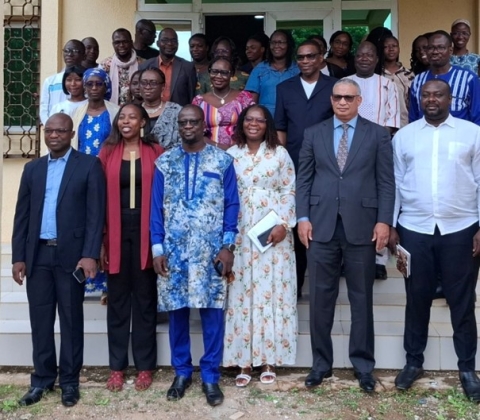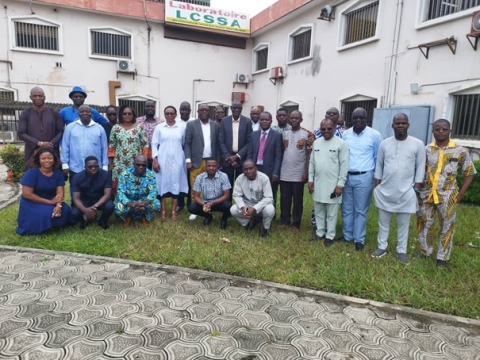From 5 to 9 May 2025, the Malian capital of Bamako hosted an exceptional edition of the PRESASS Forum, devoted to seasonal forecasts for West Africa and the Sahel. After 20 years in operation, this edition broke several records in terms of participation, technological innovation, community involvement and dissemination of results. A major milestone for climate resilience in the region, thanks to the support of the West Africa Food System Resilience Programme (FRSP) Component 1 funded by the World Bank.
A historic turnout
Never before in the history of the PRESASS Forum - initiated in the 2000s - has a single event attracted so many participants. With more than 280 participants from the 17 member countries of West Africa and the Sahel, the Bamako event exceeded expectations.
 This record attendance is all the more significant in that it reflects a strong regional dynamic of cooperation around climate risk management. Experts from national meteorological and hydrological services, researchers, representatives of regional institutions, farmers' organisations and representatives of civil society, humanitarian actors, journalists and communicators all came together to give substance to a shared vision: anticipate to act more effectively. "This massive turnout reflects a collective awareness that climate information is not a privilege, but a necessity", said Dr Agali Alhassane, Agrometeorological Expert and coordinator of component 1 of the FRSP.
This record attendance is all the more significant in that it reflects a strong regional dynamic of cooperation around climate risk management. Experts from national meteorological and hydrological services, researchers, representatives of regional institutions, farmers' organisations and representatives of civil society, humanitarian actors, journalists and communicators all came together to give substance to a shared vision: anticipate to act more effectively. "This massive turnout reflects a collective awareness that climate information is not a privilege, but a necessity", said Dr Agali Alhassane, Agrometeorological Expert and coordinator of component 1 of the FRSP.
Innovative digital services at the heart of the forum: AI to improve forecasting
The 2025 edition of the PRESASS Forum in Bamako marked a decisive turning point in the development of seasonal forecasts in West Africa and the Sahel. For the first time, artificial intelligence played a major role in the arsenal of forecasting tools used at the forum. This was made possible by intensive training sessions organised prior to the forum to build the capacity of national experts in a new generation of seasonal forecasts, based on objective approaches, breaking with the traditional consensual approach often marked by expert judgements considered subjective because they cannot be reproduced by third parties.
Thanks to the support of the AICCRA (Accelerating the Impacts of CGIAR Climate Research for Africa) and FSRP (Food System Resilience Program) projects, funded by the World Bank, this transition towards objective forecasts has resulted in the development and implementation of innovative tools such as WASS2S (West-African and Sahel Seasonal to Sub-seasonal), which automate traditional statistical methods while incorporating the potential of artificial intelligence (AI), particularly Deep Learning.
These new tools are used to correct the biases in the output of the global climate centres' forecasting models using learning algorithms, to produce specific forecasts, and to combine traditional approaches with those of artificial intelligence. The process is now automated, traceable and reproducible: any climatologist in any country can apply the same methodology and obtain the same results. Although this approach has not yet been officially launched, the Bamako forum has enabled it to be used on a trial basis by a large number of climatologists. The official launch is planned for the very near future, with the participation of the directors of the national meteorological and hydrological services, to officially mark the institutional adoption of this new generation of seasonal forecasting services.
These innovations now place artificial intelligence at the heart of the seasonal forecasting process in West Africa and the Sahel, paving the way for more reliable, reproducible and transparent climate services tailored to the needs of end users. The PRESASS 2025 Forum thus marks the advent of a new era in which innovative climate services can further strengthen the resilience of the people of the Sahel and West Africa.
Co-production of climate information: users get fully involved
One of the aspects that this edition particularly emphasised was the direct involvement of users in the process of co-production in the interpretation of seasonal forecast products and the drafting of the final communiqué and recommendations. Farmers, livestock breeders, managers of water and hydroelectric power facilities, community development workers and representatives of farmers' organisations, as well as men and women from the media, took an active part in the working groups alongside the scientists. "We finally felt that our voice counted, that the advice was taking our local realities into account", said a Malian farmer who was the first to request climate information from Mali Météo.
This participatory approach has made it possible to enrich forecast information with local perceptions, to adapt messages to realities on the ground, and to co-develop agro-hydro-climatic advice based on both modern science and endogenous knowledge.
Broad dissemination of results: forecasting for the benefit of all
![]() One of the strengths of this year's event was the quality and scope of the communication surrounding the results of the forum. The final communiqué from the seasonal forecasts forum was translated into English, then shared with all the stakeholders via television, radio, the written press and digital platforms (websites, social networks, etc.) at national and regional level, which enabled multiple beneficiaries to be reached.
One of the strengths of this year's event was the quality and scope of the communication surrounding the results of the forum. The final communiqué from the seasonal forecasts forum was translated into English, then shared with all the stakeholders via television, radio, the written press and digital platforms (websites, social networks, etc.) at national and regional level, which enabled multiple beneficiaries to be reached.
These results were relayed by a number of partner community radio stations, which translated the information into several national languages. "PRESASS 2025 has made it possible for people to take greater ownership of climate information. In my country, almost everyone now knows the trend for the coming season", said a journalist from Niger.
This inclusive communication strategy, combined with the feedback workshops organised by the countries (see table), encourages the widespread dissemination of climate forecasts, strengthening decision-making at all levels: from national authorities to farm households.
![]()
| Some examples of countries that have held feedback workshops | |
| Burkina Faso | 6 May 2025 | |
| Mali | 25 April and 7 May 2025 | |
| Niger | 16 May 2925 | |
| Senegal | 15 May 2025 | |
The decisive support of the FSRP: a financial and logistical backbone
If the PRESASS 2025 Forum has reached this level of scale, it is largely thanks to the strategic support of Component 1 of the Food System Resilience Program (C1 FSRP) financed by the World Bank. The FSRP made it possible to: i) pay for the participation and logistics of several national delegations; ii) finance the digital platforms used during the forum; iii) produce technical and communication materials. In addition to funding, the FSRP has also positioned itself as a driving force for multi-stakeholder coordination, facilitating synergy between AGRHYMET CCR-AOS, ACMAD, the National Meteorological and Hydrological Services (NMHSs) of the 17 countries of West Africa and the Sahel, the river basin organisations and the representatives of the user interface platforms (from the agriculture and food security, water resources and disaster risk reduction, and climate security sectors). The strategic link between AICCRA and FSRP, two projects financed by the World Bank, is to be commended, with the former ensuring the promotion and appropriation of innovations in climate services, in order to create a catalyst enabling the latter to boost its investments.
Conclusion
The PRESASS 2025 Forum in Bamako not only broke attendance records, but above all set new standards for climate resilience in West Africa and the Sahel. It demonstrated that: i) technological integration (particularly AI) in climate services is a promising niche; ii) co-production guarantees more relevant and usable forecasts; iii) well-structured financial support, such as that provided by the World Bank (through the FSRP and AICCRA projects) and the AfDB (through the P2RS project), is an important lever for mobilising stakeholders and ensuring the sustainability of the process; iv) appropriate communication, focused on the use of services, is essential for transforming a forecast into anticipatory action.
After the regional forum in Bamako, the countries mobilised to take up the baton by holding national feedback sessions. Bamako 2025 heralds a new era for forecasting in West Africa and the Sahel, maximising on AI and making co-production and co-dissemination the most effective route to impact.







